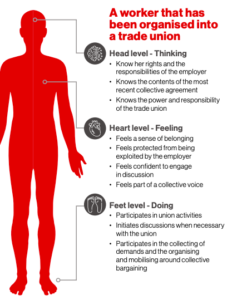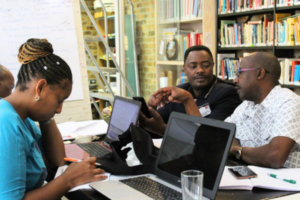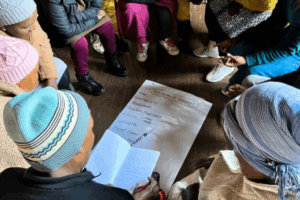Informal work can include self-employed people and those who earn a wage. Workers in the informal economy survive on very small incomes and are often exposed to unsafe conditions on the job. Informal workers also lack the protection of labour laws and social benefits enjoyed by workers in more formal employment.
In South Africa, the informal sector makes up a significant portion of the economy. Some 27 per cent of the workforce is informal, a total of over three million workers, according to COSATU – which has lobbied for the implementation of ILO recommendation 204 concerning the transition from the informal to the formal economy and worked to defend the rights of vulnerable workers.
Women tend to be concentrated in more vulnerable and lower-paying informal activities and occupations. As is the case elsewhere, women who contribute to unpaid family work form the most vulnerable form of informal employment. The COVID-19 pandemic exposed and worsened the existing inequalities and injustices faced by women in the informal economy. Organising in vulnerable sectors can ensure all workers benefit under labour laws.
The COVID-19 pandemic worsened the existing inequalities and injustices faced by women in the informal economy. Organising in vulnerable sectors can ensure all workers benefit under labour laws.
What we mean by organising
Organising delivers on the promise that a worker is part of something greater than oneself. Organising is an ongoing conversation among workers and between workers and their elected representatives.
Here is what a worker that is organised is likely to think about (the head), feel (the heart) and do (the feet):

Source: Recruitment & Organising: A background to bargaining, The LRS Negotiator’s Guide (2022)
Organising women in the informal economy
The organiser attempting to bring informal workers into the union needs to consider the particular circumstances of women.
Actions to take
- Check the situation of the women you intend to approach. Some things to look out for include cultural norms, religion, type of work and hours and organisational experience. Show respect for religion, culture, and language.
- Work with a person trusted by the women, preferably a woman who comes from within the group, or with a similar background to the targeted workers. This person is in a better position to understand and relate well with the women and is more likely to win their trust.
- Get the support of respected male champions in leadership positions to increase the visibility of the women workers. The leaders can also influence resistant parties to women’s efforts to organise.
- Find ways to meet women where they are comfortable. This may be at an existing gathering, at their workplaces, or in public and private spaces. It should be somewhere where the women don’t fear being seen with an organiser. [Go here and here for inspiring and innovative women organising strategies]
- Find the most suitable times to hold discussions and provide facilities for children who might be there.
- Explain the practical benefits of belonging to the union. Provide concrete examples of informal women workers that have attempted to organise.
- Create safe and inclusive spaces where women feel free to discuss issues of concern. Encourage the women to speak out and make their own conclusions. Be attentive and ensure that what women say is respected and valued. Respect the knowledge and experience of workers.
- Keep the discussion short and to the point.
- Work with groups of women where possible so they can support each other and build confidence.
- Encourage women to go out and organise others. Decide together on tasks to be done and who will do them.
Some barriers to recruiting women workers
Time: Women have little time to attend meetings and engage in organising activities due to their excessive responsibilities in the home and caregiving duties.
Traditional male attitudes: Husbands and partners may prevent women from joining organisations, or participating in activities.
Religion and culture: May limit women’s freedom to leave their homes and immediate area, or to interact with men
Confidence: Women may not have the confidence to join or participate in organisations.
Fear: Women might have safety concerns and fear that they will lose their livelihoods if they become active in an organisation.
What not to do
- Put women in danger by exposing their interest in organising too soon.
- Delay women and risk unsafe travel or arriving home late.
- Speak down or patronise.
- Lose patience when women take time to speak or resist joining.
- Disregard the contributions of individuals in mixed recruitment sessions, or ignore the issues raised.
- Propose love affairs, or sexually harass women.
What next?
You must maintain contact with new members. Hold meetings regularly, take up issues and help solve their problems. Provide regular information, learn through your experiences and share approaches to recruiting and organising informal workers in the union.
____
This article is adapted from WIEGO’s Recruiting Informal Workers Into Democratic Workers’ Organisations.
RELATED ARTICLE:
What you need to know about negotiating better conditions at work







